
Striving to get a glimpse of the future and, in particular, management consultancy ten years from now, on 4 November 2022 future leaders from around the world gathered for two special online discussions as part of the ICMCI Future of Management Consultancy initiative.
Cassandra Corbet moderated the session and emphasised from the start that understanding what consulting would look like in the future took knowing about its present.
How are value propositions changing in terms of how business is changing?
Siranush Gyurjinyan: To me, business consultancy is changing due to the customer and consumer transformation. As consultants, we are problem solvers. In the future, in ten years, we are still going to be problem solvers but we are going to solve different problems with different people. Our customers will transform. Businesses will transform. In ten years, we will have more 60+ customers. This is another segment to work with, another mindset. Then we have Gen Z. We need to adapt and work with all of them. It is a challenge but we, consultants, love challenges. Consultants love to scale up, upgrade and update our mindset.
Cassandra Corbet: We need to build a bridge from a generational perspective.
Sam Lee: There are different groups and different expectations when it comes to information flow. If we go back to the role of the consultant, it is not to be the business owner. Consultancy is about talent, knowledge management and result from recommendations. The talent pool is no longer specifically local: you can go to anywhere in the world. Of course, consultants have local knowledge and people are paying for that but there is more knowledge out there, information as well. What has changed is the tools we have. Now the tools we have allow us more. In the past, people expected recommendations. Now we are seeking a shift towards results. Technology shortens the chain and you can see results faster.
Cassandra Corbet: Consultancy is sometimes considered the Power-Point generation. We go and give a presentation. But now there are expectations that we are going to be there, to stand with the customers to implement it all and to see the results.
Mahdi Saeedian: Innovation and challenges are two parts we need to consider. There is incremental innovation which means that there are better technologies every day. The other part is disruptive innovation. Consultants absorb new technologies. We want to stay up to date just like our competitors. AI cannot answer all questions and solve all problems. We need to include the younger generations in the work in order to understand processes better. Close communication can help clients and consultants respond to challenges faster and better.
Christina Boseva: In venture capital, we have seen that Artificial Intelligence, especially Deep Tech, require extreme investments to reach a sustainable point. Now investors are more reluctant to invest in tech companies. We are seeing a shift towards solutions that are very easily implementable. Management consultants should invest their time to build relationships and to take part in start-up communities. Business models are changing now more than ever and faster. Being able to extrapolate and pull from your resources, from your network, is essential. This is how you create meaningful connections between clients and implement meaningful solutions.
Siranush Gyurjinyan: AI is helping us, as consultants, to organise data and use it for decision making. AI is a good tool.
Sam Lee: Technology has always been around; it just has not been commercialised. We need to use the tools and partner with people with expertise in the various tools. We will need team work and partnerships. We need to know what is useful for what. Technology will never replace human relationships because consulting is about trust.
Christina Boseva: The closer we get to the business models of tomorrow, the more we will be able to anticipate what our customers will need. ESG considerations can be taken into account early on. Creating long-lasting relations with small companies proves to be critical. Some of them grow quickly. Consultants could provide mentorship or certain services. We can be of service to companies disrupting entire industries.
How is ESG moving into the conversation?
Mahdi Saeedian: There is a heavy focus on ESG which will only grow. We need to reach a balance between financials and ESG. Future generations will demand it.
Siranush Gyurjinyan: ESG is another matter to strategise around. All messages will evolve and mix. Business KPIs become linked to ESG and SDGs. As a result of the pandemic, customers value life. They understand that it is important to take care of life and health. They see it as more than a KPI.
Cassandra Corbet: As consultants, we need to understand who is influencing the consumers. We need to help our clients understand the changes in consumer behaviour. Sometimes the young, with zero buying power, are able to influence decisions.
What is important for the incoming class of consultants to learn?
Christina Boseva: Rather than teaching them, I would go for more hands-on experience. It is important to sit with starting companies, try to identify their capacities, what resources they have and how to move forward. Sitting with a new company as a new consultant with almost no experience you can gauge what the process looks like and possibly have a positive experience on a young company.
Mahdi Saeedian: Before becoming a consultant, a person should be a good listener and a goof observer. Coaching can be useful for them as a practical skill. Also programming and using data.
Sam Lee: Cross-cultural communication. Collaboration becomes very important and you work with people from around the world.
Siranush Gyurjinyan: I would suggest that they develop three main skills: 1) management skills, to understand a business and have the big picture; 2) data analysis and data science; 3) mindfulness and meditation, to be able to keep quiet and balance while analysing data and working with different people.
Cassandra Corbet: It is interesting that data has come up. The largest companies today do not produce something tangible. Data is becoming the superpower of tomorrow.
Geordie van der Nest: It would be good to teach the future generation how to sift through the vast amount of data available on the internet, how to validate data or how to find research based information if they want to make business decisions.
Peter Westlund, Australia: A problem many face is the deluge of hacking of large company data bases. When you gather data from clients, there are two aspects: the data the client holds and the data the consultant holds about the client. The implications will be significant.
Sam Lee: Data is inevitable. The first level is awareness of what data is being used and who is using it. More regulations are in place to make sure that data is put to a good use. To ensure that data is as productive as possible. There will never be a perfect measure.
Cassandra Corbet: People are actively choosing not to share their data.
Siranush Gyurjinyan: AI works when there is enough data. For security reasons, there needs to be protection. But for AI, we need the information. We need to share the information in a smart way.
Mahdi Saeedian: As long as we use the internet, there is a negative side that nothing is private. The positive side is that there are policies and new technologies that can protect our personal data or client data.
Lydia Goh, Singapore: Technology has changed the map. In a world of hyper media, how can we be more effective in managing cross-cultural virtual teams and in leading people in a hybrid environment?
Cassandra Corbet: I am a huge champion of hybrid working. You need to make sure that it is not all business. In this way, you do not bring in together strangers. This breaks down the barrier to being able to collaborate.
Siranush Gyurjinyan: Technology is good but at some point we need to meet. We need to understand one’s mindset and we cannot do it with technology.
Christina Boseva: Physical connection is key. But it is also exciting to see what VR have in store for us.
Meet the panellists:
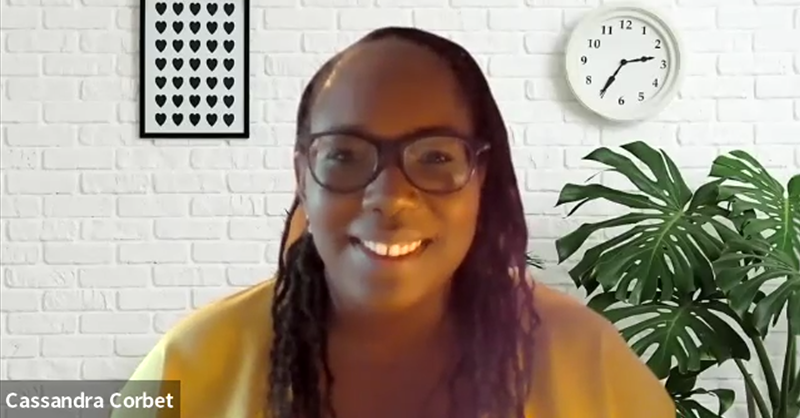 Cassandra Corbet has been working in management consultancy and advisory for over 15 years across public sector bodies and health care structures in the US, UAE and Ireland. Her professional passions lie in capabilities such as Change Management, Design Thinking, Team Building, Communication, Stakeholder Engagement, Programme and Project Management and Strategic Planning.
Cassandra Corbet has been working in management consultancy and advisory for over 15 years across public sector bodies and health care structures in the US, UAE and Ireland. Her professional passions lie in capabilities such as Change Management, Design Thinking, Team Building, Communication, Stakeholder Engagement, Programme and Project Management and Strategic Planning.
Cassandra is a board member of the IMCA focusing on the development of mid-career Consultants and Chair of the IMCA’s ‘Young Consultants Group’. She is currently a Lead Consultant for Novartis where she leads multi-disciplinary teams through global transformations.
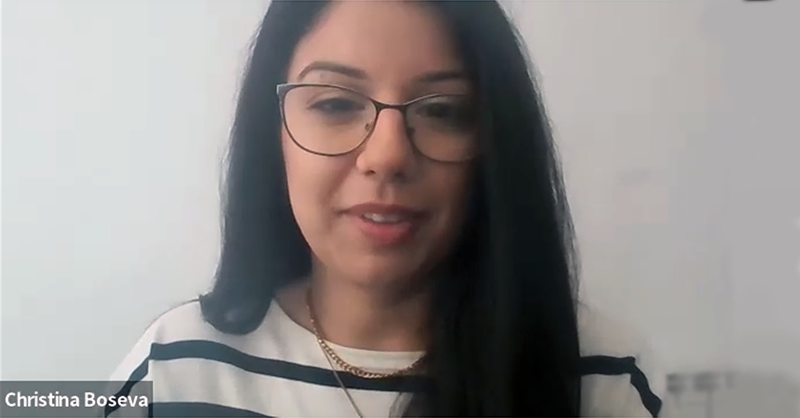 Christina Boseva is an Investment Associate at IMPETUS Capital, an Alternative investment fund manager based in Bulgaria, where she is responsible for deal sourcing, transaction valuations, due diligence and operations stages. Previously she worked on major CEE and Bulgarian M&A projects, including due diligence and valuation assignments as a senior Strategy & Transactions Consultant at EY. She has studied at Rotterdam School of Management with a focus on business valuation investments, private equity and financial modelling.
Christina Boseva is an Investment Associate at IMPETUS Capital, an Alternative investment fund manager based in Bulgaria, where she is responsible for deal sourcing, transaction valuations, due diligence and operations stages. Previously she worked on major CEE and Bulgarian M&A projects, including due diligence and valuation assignments as a senior Strategy & Transactions Consultant at EY. She has studied at Rotterdam School of Management with a focus on business valuation investments, private equity and financial modelling.
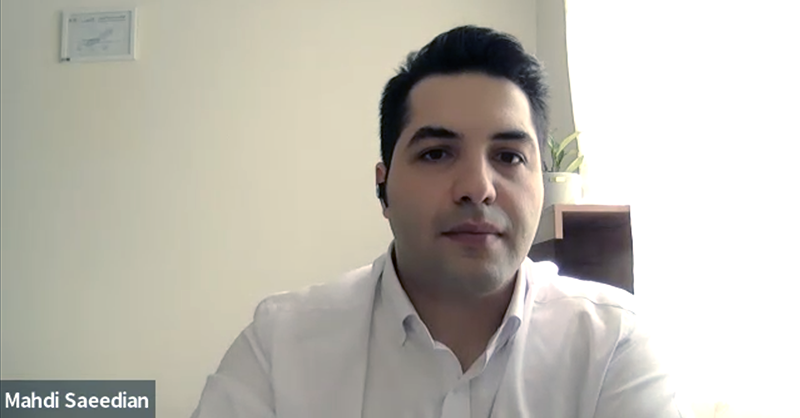 MohammadMahdi Saeedian, CMC®, is a member of the Iran Management Consultants Association (IMCA) and its Innovation Committee. His main field of activity is concentrated on innovation studies and research with a particular focus on innovation strategies and platform ecosystems. As a consultant, his work is dedicated to the advancement of science and collaboration. His main activities include consulting for digital platforms, investment strategies, and knowledge-based SMEs.
MohammadMahdi Saeedian, CMC®, is a member of the Iran Management Consultants Association (IMCA) and its Innovation Committee. His main field of activity is concentrated on innovation studies and research with a particular focus on innovation strategies and platform ecosystems. As a consultant, his work is dedicated to the advancement of science and collaboration. His main activities include consulting for digital platforms, investment strategies, and knowledge-based SMEs.
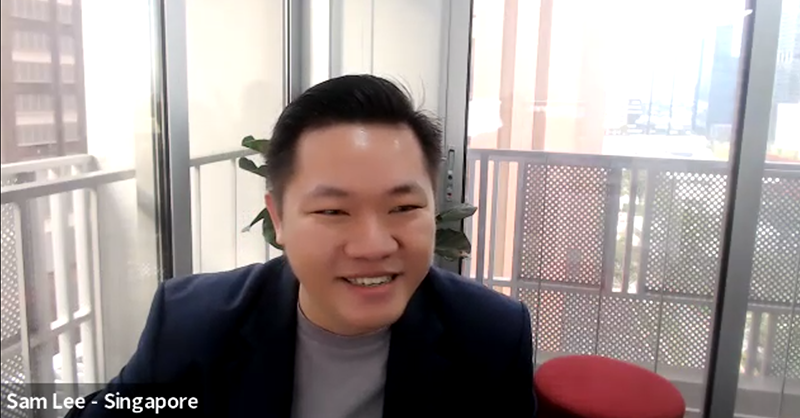
Sam Lee is a Registered Management Consultant and currently serves as Partner, Corporate Finance and Advisory at Paloe. He has specialised in preparing seed-stage start-ups for Series A round and has acted as interim CFO for various tech companies during their fundraising phases. He has also built financial models for more than 70 companies and honed the art of articulating their stories using numbers.
Before founding Paloe, he was the pioneer batch of M&A professionals at KPMG to be sent to Myanmar. Thereafter, he took up an Investment Manager role with Maersk Group to explore infrastructure opportunities in Asia. Concurrently, he held the appointment of Deputy Lead in the Communities of Practice – Digitalization at the Institute of Management Consultants Singapore.
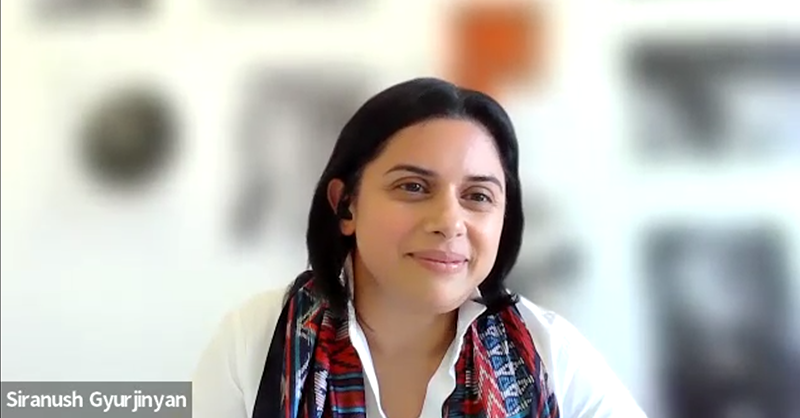 Siranuysh Gyurjinyan, CMC® is a member of the Institute of Management Consulting of Armenia. She is an experienced communications expert and business management consultant having worked on diverse projects in the telecommunications industry as well as in both the private and the public sectors. Her expertise covers strategic management, operations management, negotiations, business planning, advertising, external relationships, internal communications and event management.
Siranuysh Gyurjinyan, CMC® is a member of the Institute of Management Consulting of Armenia. She is an experienced communications expert and business management consultant having worked on diverse projects in the telecommunications industry as well as in both the private and the public sectors. Her expertise covers strategic management, operations management, negotiations, business planning, advertising, external relationships, internal communications and event management.
About the Future of Management Consultancy
Combining a series of events, discussions and publications, the ICMCI Future of Management Consultancy initiative strives to promote the global conversation about the future of the profession towards developing a common vision to help and inspire consultants all over the world.
Designed as an “open source” and inclusive platform, the Future of Management Consultancy is an opportunity to seek answers to pressing questions and to encourage interactive communication and joint idea generation.






